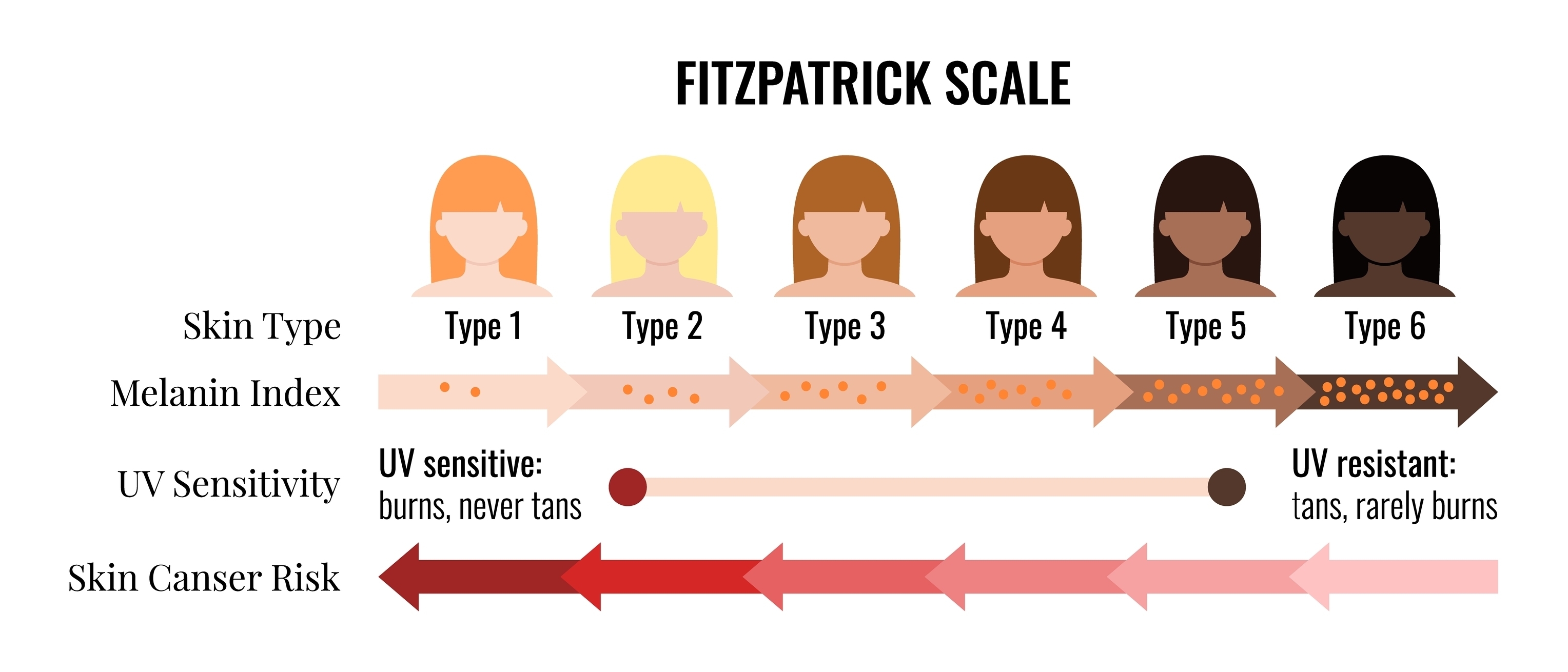All skin complexions are beautiful, but skin care isn't one-size-fits-all. Different complexions may have unique needs. Knowing about your complexion can help you understand your risk of sun damage over time and inform your choices when you're building a skin care routine. Here's what you should know.
What Is Skin Complexion?
The term "complexion" comes up often in everyday conversation, but it's not actually a word that's used or defined in dermatology. When most people refer to skin complexion, however, they're talking about the six Fitzpatrick skin types. These describe how much melanin pigment is in the skin, and they're determined both by skin color and how the skin responds to ultraviolet radiation.
Before reviewing the different complexions, it's important to distinguish the Fitzpatrick scale from your skin type, which refers to oily, dry, or combination skin. The Fitzpatrick types are also more specific than skin tone (light, medium, or dark skin) and skin undertone, which ranges from warm to cool colors.
Here are the different skin complexions according to the Fitzpatrick scale:
- Type I is the lightest skin type. It has the least amount of melanin, so it always burns and never tans. People with this skin type usually have blonde or red hair and blue or green eyes.
- Type II is also fair. While people with this skin type usually burn in the sun, they'll sometimes tan.
- Type III includes darker white skin that will gradually tan to a light brown after burning.
- Type IV includes light brown or olive skin that burns minimally and tans easily.
- Type V is brown skin that rarely burns and tans easily.
- Type VI is the darkest complexion and includes dark brown or Black skin. It has the most melanin, so it rarely burns and always tans.
Why Is Your Complexion Important?
Knowing your complexion can help you understand how your skin responds to the sun and your risk of sunburn and sun damage. But while skin cancer is more common in people with lighter skin, people with dark complexions are still at risk. That's why daily sunscreen is a must for everyone, regardless of complexion. Some products work for all skin types and complexions, like EltaMD UV Sheer Broad-Spectrum SPF 50+. If you're looking for a tinted formula, EltaMD UV Restore Tinted Broad-Spectrum SPF 40 is another great option.
Some complexions are more prone to certain skin conditions. For example, rosacea—which causes facial flushing and pimples—is more common in people with Type I or Type II skin. Skin hyperpigmentation, like melasma or post-inflammatory hyperpigmentation, is more common in darker skin tones (Type IV or darker). If you're in this group, ingredients like Kojic Acid, Retinol, and Vitamin C can help reduce any dark spots you already have and keep new ones from forming.
How Can You Identify Your Skin Complexion?
If you're not sure which complexion describes your skin, don't worry. It's not an exact science. Start with your basic skin color and then think about how your skin responds to the sun.
In general, people with white skin make up the lighter skin types, people with brown skin have the middle skin types, and people with Black skin have the darker skin types. But there can be some overlap, especially when you consider the likelihood of your skin burning or tanning in the sun. Most people have an idea of how sensitive their skin is to sunburn from when they didn't wear sunscreen (perhaps as a child) or forgot to reapply after swimming or sweating.
If you're still not sure which complexion you are, your Dermatologist can help you figure it out. Identifying your skin complexion will help you understand your risk for common skin conditions and serve as a valuable tool to attain your healthiest, most vibrant skin.

